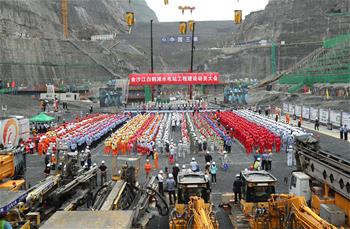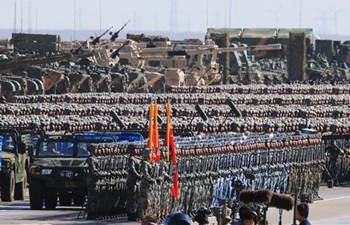by Zheng Jianghua
BRUSSELS, Aug. 3 (Xinhua) ---- The newly--adopted U.S. sanctions against Russia sparked a backlash in the European Union (EU) and risks further damaging transatlantic relations, which have already been soured since Donald Trump took office, a senior analyst cautioned.
Critics of Nord Stream--2, a twin pipeline system via the Baltic Sea transporting natural gas from Russia to the EU, will "view the U.S. sanctions as a chance to put pressure on Berlin to end its support for the project," wrote Judy Dempsey, non--resident senior fellow of Brussels--based think tank Carnegie Europe, underscoring that the European unity is at stake.
In the wake of Trump signing into law a sanctions bill against countries of Russia, Iran and the Democratic People's Republic of Korea (DPRK), European Commission President Jean Claude--Juncker on Wednesday warned that the EU was ready to take "appropriate steps" if European firms' interests are undermined.
Prior to Trump's grudging green--light to the bill, the U.S. House of Representatives in a rare bipartisan move approved the sanctions bill by a vote of 419 to 3 with the Senate passing the bill by 98 to 2.
The near--unanimous congressional approval indicated a bipartisan consensus to punish Russia for the Ukraine crisis and its alleged meddling in the 2016 presidential election, which Moscow had for long been strongly denied.
Trump described the bill as "seriously flawed," but still signed it "for the sake of national unity."
Under the bill, companies supporting Russia in building energy export pipelines would be fined, a prospect that irks the EU as five European energy companies are involved in the Russia energy giant Gazprom--led Nord Stream--2 project.
The project aims to expand an existing gas pipeline from Russia to Germany under the Baltic Sea, bypassing the territory of Ukraine, Poland and the Baltic states.
Supporters of Nord Stream 2, notably Germany and Austria, argue that the project will diversify the EU's gas imports at a time when the bloc's own gas production is dwindling. Critics such as Poland, Slovakia and the Baltic states, regard it as a geopolitical project contradicting the plan to create the European energy union and lessen Europe's overreliance on Russian gas.
Moreover, Ukraine, the current major transit country for Russian gas exports to Europe, dreads losing transit fees once the project is set in motion at the end of 2019, when Ukraine's gas transit agreement with Russia's Gazprom expires.
Russia then plans to switch its gas transit route for European countries to the Turkish Stream and Nord Stream routes, bypassing Ukraine.
But the fallout of the U.S. sanctions bill goes far beyond the Nord Stream--2, Dempsey noted, underlining that European firm working with Russian energy company Lukoil, which is developing the large Shah Deniz gas field in Azerbaijan, would also be fined.
The Southern Corridor, which would be fed gas from the Shah Deniz field, thus would be affected by the sanctions, imperiling Europe's energy security and diversification, Dempsey wrote, noting that U.S. energy companies will cash in on the sanctions.
"When the new U.S. sanctions bill was first unveiled, Germany and Austria accused Washington of using the measures to allow U.S. energy companies to enter the lucrative European market by shipping liquefied natural gas to new terminals in Europe and thus make up any shortfall in Russian gas imports," Dempsey wrote.
"The reaction from the commission is understandable. The U.S. measures hit European interests. The sanctions serve the interests of American companies that want to expand their presence in Europe," Dempsey added.
The EU has been unnerved by the Trump administration's unremitting call for scaling up their defense spending to meet NATO's threshold of 2 percent of GDP. Brussels also bristled at Washington's decision to withdraw from the Paris agreement on climate change.
Whether the Unites states will enact the new sanctions against Russia heedless of EU interests and what "appropriate steps" the EU will take are mooted points at this stage, but the bill has cast a heavy shadow, again, over transatlantic relations.

















